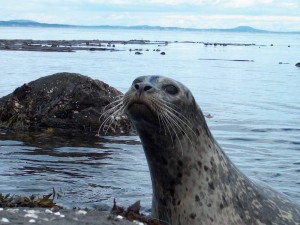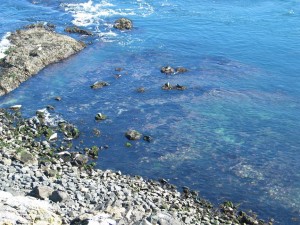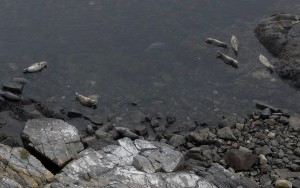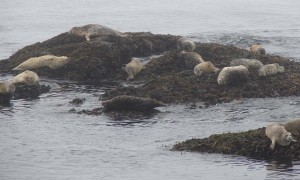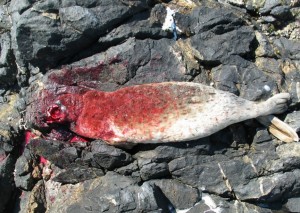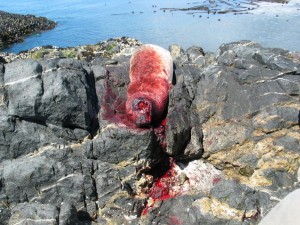The total harbour seal population in the eastern north Pacific is estimated to be 330,000, and in California the estimated population was 40,000 in 1997. They usually are found in small groups, but sometimes occur in numbers of up to 500.

RANGE/HABITAT: Harbour seals are found across the Northern Hemisphere in both the Atlantic and Pacific Oceans. In the Northeast Pacific, they range from Alaska to Baja California, in Mexico. They favor near-shore coastal waters and frequent sandy beaches, mudflats, bays, and estuaries.
See the most recent posts on harbour seals by the Ecoguardians at Race Rocks
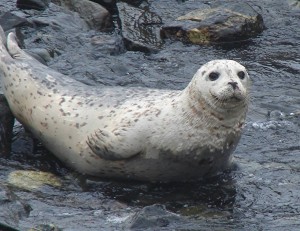 Harbour seals spend about half their time on land and half in water, and they sometimes sleep in water. They can dive to 1,500 feet (457 m) for up to 40 minutes, although their average dive lasts 3 to 7 minutes. They are opportunistic feeders and hunt for sole, flounder, sculpin, hake, cod, herring, octopus, and squid.They will also take fairly large salmon.
Harbour seals spend about half their time on land and half in water, and they sometimes sleep in water. They can dive to 1,500 feet (457 m) for up to 40 minutes, although their average dive lasts 3 to 7 minutes. They are opportunistic feeders and hunt for sole, flounder, sculpin, hake, cod, herring, octopus, and squid.They will also take fairly large salmon.
This image of a mother an baby harbour seal was taken by Ryan Murphy when he was the Ecoguardian at Race Rocks 2009-2011 See this and many more excellent shots on his Flickr album of Race Rocks Seals here.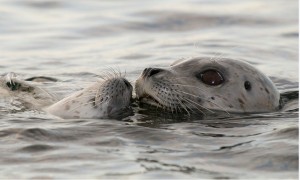
” Ryan and I were doing a live webcast from West Race Rocks, when we came across this harbour seal. It kept returning for a view of our activities so we were able to take several video shots while it hovered nearby. We noticed how it seemed to like returning to this rock pinnacle which was covered with kelp and the plumose anemone. When the lights of the camera get in at close range on the stalks or stipes of the kelp, you can see the brightly colored brooding anemone.” Andras Rozmer, (PC year 26)
Birthing location. Mother and and baby harbour seal. A few scenes taken in June at the time of the harbour seals giving birth. Note membranes still attached to the mother in the swimming scenes near the end.
Harbour seals are year-round residents of Race Rocks. Their numbers increase to over 400 in June and July at the peak of the pupping season. This video shows a quiet scene with seals hauled out on the shore on the west side of Race Rocks.
Domain: Eukarya
Kingdom: Animalia
Phylum: Chordata
Class: Mammalia
Order: Carnivora
Clade: Pinnipedia
Family: Phocidae
Genus : Phoca
Species : vitulina
Phoca vitulina (Linnaeus, 1758 )
COMMON NAME: Harbour Seal
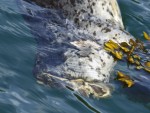 At Race Rocks,the Harbour seals are year round residents, although their numbers peak in mid summer to over 400. They have pups on the island from March to July. This file shows what happens if boat traffic is too fast in the ecological reserve or around any seal haulout area,
At Race Rocks,the Harbour seals are year round residents, although their numbers peak in mid summer to over 400. They have pups on the island from March to July. This file shows what happens if boat traffic is too fast in the ecological reserve or around any seal haulout area,
Damion Wilson PC Year 27.
Other Members of the Class Mammalia at Race Rocks.
See the most recent posts on harbour seals by the Ecoguardians at Race Rocks
and Image File |
 The Race Rocks taxonomy is a collaborative venture originally started with the Biology and Environmental Systems students of Lester Pearson College UWC. It now also has contributions added by Faculty, Staff, Volunteers and Observers on the remote control webcams. The Race Rocks taxonomy is a collaborative venture originally started with the Biology and Environmental Systems students of Lester Pearson College UWC. It now also has contributions added by Faculty, Staff, Volunteers and Observers on the remote control webcams. |

